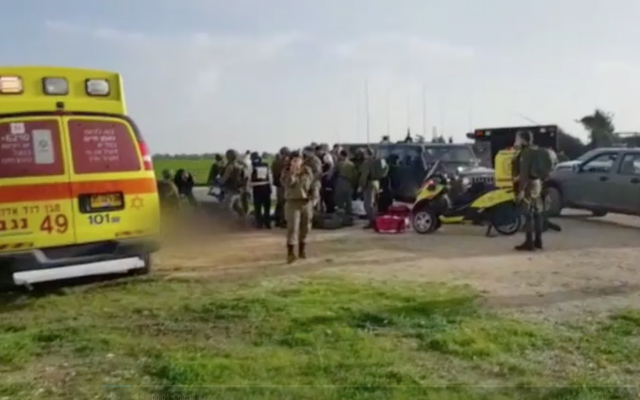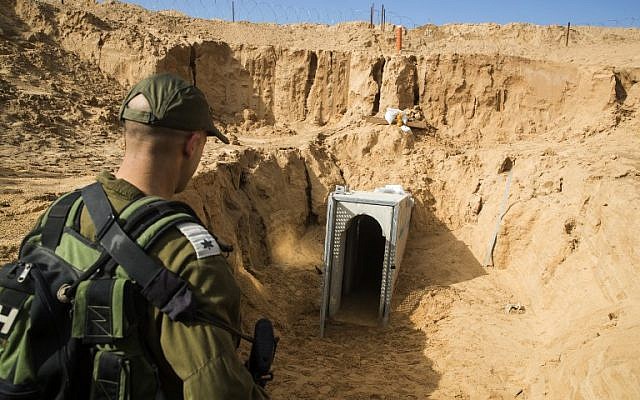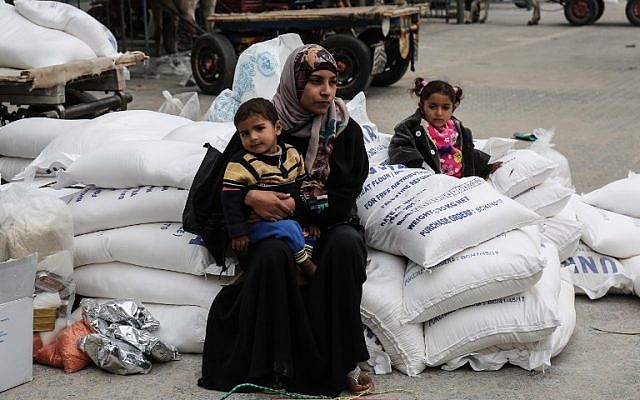Troops were removing a flag from border fence when blast occurred; IDF tank hits observation post; Netanyahu promises ‘we will respond appropriately’

Four IDF soldiers were wounded when an explosive device was detonated on an IDF patrol along the Gaza Strip border on Saturday. Two of the soldiers were in a serious condition and two were moderately hurt, the army said.
An Israeli tank fired a shell at an observation post in response to the attack, the army said.
Prime Minister Benjamin Netanyahu, who is in Germany, called the incident “serious” and vowed Israel will respond.
“The incident on the Gaza border is very serious. We will respond appropriately,” Netanayhu said, sending his wishes for a rapid recovery to the injured soldiers.
President Reuven Rivlin said Israel would not be cowed by terror.
“We will not be quiet in the face of any type of terror against our soldiers who are protecting the lives of the citizens of Israel,” he said.
The incident occurred in the southern Gaza area near the city of Khan Younis, the IDF said. Information regarding the condition of the soldiers had been censored until their families were notified.
The soldiers were evacuated by helicopter to Soroka hospital in Beersheeba for treatment, where three of them were rushed into surgery. Doctors said described their conditions were stable and not life threatening.
An IDF spokesperson called the attack “a serious incident that aimed at destabilizing the region.”
The spokesperson told reporters that the patrol stopped along the border to remove a flag that had been placed at the fence a day earlier during a protest, and that a device planted below the flag then detonated.
The spokesperson said that the patrol — made up of Golani infantry soldiers and members of a combat engineering unit — was operating with standard procedures to remove any foreign object from the border fence, but that these would now be reviewed.
Hadashot news TV reported said that further IDF retaliatory fire was likely.
Israel Radio’s military correspondent called the incident “serious” and “irregular,” and Hebrew media reports said large IDF forces had been moved into the region.
Palestinian media said the observation post targeted by the IDF in response belonged to the Palestinian Islamic Jihad. There were no immediate claims of responsibility from the Palestinians.
Islamic Jihad has been vowing to avenge an incident where Israel destroyed one of the terrorist group’s attack tunnels that crossed from Gaza into Israel, killing many of the groups members.

On October 30, the IDF blew up the tunnel, which originated in the Gazan city of Khan Younis and crossed into Israeli territory, near Kibbutz Kissufim.
According to the army, the tunnel had been under surveillance the entire time that it was inside Israeli territory and did not pose a threat to civilians.
Some 14 terrorists, mostly from the Iran-backed group, including two senior officers, were killed in the blast and its aftermath. The army said later that this was not the primary objective of the tunnel demolition.
The incident comes amid mounting warnings that tensions in Gaza could lead to a new conflict between Israel and Gaza’s Hamas rulers. Israel holds Hamas responsible for any violence emanating from the Strip.
Last week IDF Chief of Staff Gadi Eisenkot warned ministers during a cabinet meeting that Israel could soon face another war with Gaza-based terror group Hamas, as a result of the deteriorating humanitarian and economic conditions in the coastal enclave.
In a security assessment handed recently to Prime Minister Benjamin Netanyahu, the defense establishment reiterated its belief that Hamas is not interested in another conflict with Israel. However, an economic collapse would make such a scenario inevitable.
Hamas, which seized control of the Gaza Strip from the Palestinian Authority in 2007, has been under increasing pressure as the coastal enclave teeters on the verge of an economic and infrastructure collapse that UN Middle East peace envoy Nickolay Mladenov last week said was already “well beyond” a humanitarian crisis.

Last month, the US froze over $100 million in contributions to UNRWA, the UN agency for Palestinian refugees, after the Palestinians announced they would no longer accept the US as a mediator in peace talks with Israel. The Palestinians were angered after US President Donald Trump on December 6 recognized Jerusalem as Israel’s capital.
As reported by The Times of Israel
